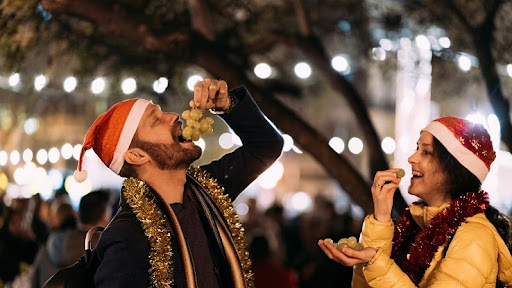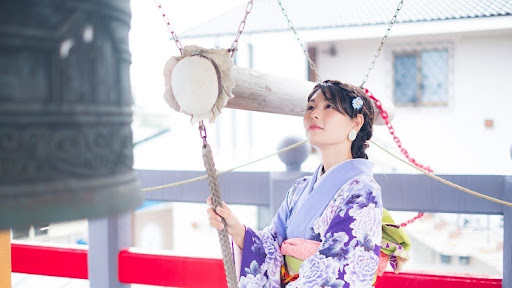
Every winter holiday has its own fun (and important!) traditions, from trimming trees in tinsel to lighting candles to enjoying feasts with friends and family. But while people celebrate holidays like Christmas and Hanukkah pretty similarly around the world, things take a much more unique turn when it comes to ringing in the new year.
Across the globe, different countries and cultures don’t just focus on the promise of a fresh start when New Year’s Eve rolls around — they also want to ensure the coming year is as lucky and prosperous as it can possibly be. As a result, they celebrate with interesting traditions meant to encourage good fortune and lots of luck. As you get ready to watch the ball drop or marvel at a fireworks display this year, bring in even more invigorating New Year’s energy by checking out some of the fun and distinctive global good luck rituals that mark the day.
12 Grapes at the Stroke of Midnight in Spain

When the clock strikes midnight and New Year’s Eve officially becomes New Year’s Day in Spain, people around the country stuff their mouths with 12 grapes — one at each chime of the clock. These grapes represent the 12 months of the year and are meant to bring good luck. It’s believed that, if you can finish chewing and swallowing your grapes by the time the clock stops chiming, all 12 of the coming months will bring good fortune. To stay on the safe side, many people pick small, seedless grapes that are easier to eat quickly.
Sheep Figurines in Mexico
New year, new ewe? In Mexico, people gift each other small sheep figurines as symbols of good fortune and money in the new year. Many people tuck the sheep figurines behind their front doors to promote prosperity when the calendar turns over to January 1. The connection between cash and the cuddly creatures is a fun one: The word “lana,” which means “wool” in Spanish, is also slang for “money” in Mexico.
Similarly to Spain, people in Mexico also believe in eating a dozen grapes at each chime of the clock when midnight rolls around. Instead of bringing good luck, however, each grape someone eats represents one wish they want to come true in the new year. And this 12-centric tradition doesn’t end in Spain or Mexico, either; in the Philippines, people eat 12 round fruits to bring abundance in the coming year.
7 Waves and 7 Pomegranate Seeds in Brazil

In Spain, Mexico and the Philippines, 12 seems to be a magic number — but Brazilians believe in the power of seven. At the stroke of midnight, Brazilians chew seven pomegranate seeds but don’t swallow them. Instead, people tuck the seeds into their wallets or purses to ensure their pockets are filled with money in the new year.
There’s a second option for those who don’t like chewing seeds: getting into the ocean and jumping seven waves to get seven New Year’s wishes. After fireworks displays are over in seaside towns, crowds wander down to the water’s edge, jump over seven waves as they make seven wishes, and then head home. Many Brazilians don all-white clothing for the event but wear colorful bathing suits underneath that show through after a few leaps over the waves. Each bathing suit color is said to represent the type of wish a person is making for the new year.
Broken Plates in Denmark
Breaking plates isn’t usually something to celebrate — in some cultures it’s considered bad luck — but in Denmark it’s definitely positive. Throughout the year, Danish people collect chipped plates and cups. Then, on New Year’s Eve, they bring them out and smash them on the doorsteps of friends and family members. It’s believed that, the bigger your plate pile is on New Year’s Day, the more luck you’ll have in the coming year. It’s not such a bad mess to have to clean up when you look at it that way, is it?
Empty Suitcases in Colombia

A simple act that we might not think much of after returning from a vacation — emptying suitcases — is a good luck tradition in Colombia. On New Year’s Eve, many Colombians empty out their suitcases, grab them and run around the block as fast as possible. The idea behind this is that a quick jaunt with suitcases will bring travel in the new year. And some Colombian luck traditions don’t stop there. People around the country also eat lentils and rice to bring money and good luck the new year. They may also eat 12 grapes and hold some Colombian pesos in their hands when midnight strikes, all in the hopes of having a financially stable year.
First-Footing in Scotland
Celebrating with loved ones is always a nice way to ring in a holiday, but Scottish people take things a step further by promoting good fortune in the year ahead via those they welcome into their houses. The custom of first-footing pays special attention to the first guest to visit a home after midnight strikes. Some individuals are thought to bring bad luck, while others bring good luck.
To make sure that their homes attract a streak of luck, Scottish revelers have one party guest leave the house before midnight and then re-enter after midnight — a party guest who’s thought to bring good luck. This “first-footer” typically brings gifts representing prosperity into the home upon their return.
New Year’s Eve Bells in Japan

In Japan, people take lucky numbers to new heights: They ring temple bells 108 times to usher in the New Year. The Joya-no-Kane custom is practiced throughout Japan, where temple visitors and priests ring large bells 107 times before midnight on December 31. Then, they sound the bells one last time when the clock strikes midnight to eliminate any lingering problems and worries from the previous year.
Smashed Pomegranates in Turkey
While Brazilians chew seven pomegranate seeds, people in Turkey take things a step further by smashing them instead. Across Turkey, the pomegranate is seen as more than a fruit; it’s a symbol of abundance, health, fertility and prosperity. Turkish people smash pomegranates on their doorsteps on New Year’s Eve to release all that symbolic energy and attract good fortune for the coming year. Those who don’t have pomegranates in the pantry sprinkle some salt across their doorways for good luck.






